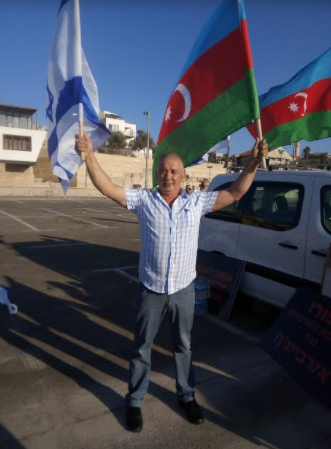By Rachel Avraham
Recently, Azerbaijani President Ilham Aliyev from his own initiative offered to help Israel improve its relationship with Turkey. He did this as a token of appreciation for how Israel helped Azerbaijan during the Second Karabakh War, with political, strategic, and humanitarian aid. If President Aliyev is successful in mending Israeli-Turkish relations, it would be another major accomplishment for the State of Israel in the wake of the Abraham Accords, after the United Arab Emirates, Sudan, Bahrain, Bhutan, and Morocco made peace with Israel, with new discussions that maybe Oman and Indonesia will follow suite.
Ilhm Aliyev has always sought a friendly and peaceful relationship between Israel and Turkey. He once compared his country’s relationship with Israel to an iceberg: Nine-tenths of it is below the surface,” emphasizing excellent relationship with Israel and the Jewish community. He also attaches great importance to the positive relations between Israel and Turkey. The history of Israel-Azerbaijan relations has been of strategic nature for more than 10 years. The State of Israel sees Azerbaijan as the most reliable partner in the Muslim world. So, Azerbaijan’s role in improving Turkish-Israeli relations is very important.
MK Ayoob Kara proclaimed: “For what do we need 100 million Turks to hate us if we can be in a good relationship? Turkey, Afghanistan, Indonesia and much of the Muslim world are beginning to cooperate with Israel to build a new relationship. It is better to be clever for we can find benefit also from the Turks. Who knows how the relationship can change? I was the only one who supported the agreement with the Turks after the Flotilla. People now say that I was right in my steps. Today, the relationship between Turkey and Israel is extraordinarily strong. For many years, the trade between Israel and Turkey is more than any state in the Middle East and Europe. Only Germany has a better economic relationship.”
After the Mavi Marmara affair, Kara noted that many people in Israel did not want to cooperate with Turkey, but he went against the trend and continued to encourage Turkish-Israeli business relations, which eventually led to the existence of six billion dollars’ worth of trade annually between the two countries. Thanks to this decision, now following the Second Karabakh War, it is possible for President Aliyev to intervene to improve the Turkish-Israeli relationship further, as both countries are allies of Azerbaijan.
Indeed, aside from promoting positive economic, cultural, and political ties between the two nations, the Jewish community in the Caucasian country and in the Diaspora offered Azerbaijan critical humanitarian and strategic support during the Second Karabakh War. Arye Gut, the director of the Azerbaijan House in Israel, noted that Azerbaijani Jews were on the frontlines helping other Azerbaijani Diaspora organizations in aiding the Caucasus nation during its hour of need. In Israel, there were solidarity protests supporting Azerbaijan and numerous articles appeared in the Jewish media supporting Baku.
The Jewish American community also assisted the Azerbaijani diaspora in the United States during these difficult times. The hard work performed by Jewish human rights lawyer Irina Tsukerman and the American Jewish Committee has especially been noteworthy. As Yakov Abramov, the representative of the Azerbaijani Jewish community in the United States, proclaimed: “Azerbaijan is the homeland of many peoples with a variety of cultures and languages, and we can safely say that multiculturalism is a great achievement for Azerbaijan. Azerbaijan is a nation run by modern Muslims, where they were able to perfectly combine ethnocultural and secular components in reasonable proportions in a country where representatives of different cultures live. As a person who has been studying and developing external relations of communities for many years, I am sure that for many countries Azerbaijan can serve as a good example. It is important to note here that, unlike many countries, the diaspora of Azerbaijan is also ethnically diverse and the difference in comparison with other diasporas is obvious.”
The Jewish and Azerbaijani communities had many means of organizing during the Second Karabakh War in the diaspora. “For operational communication between the leaders of diaspora organizations, the use of WhatsApp groups was highly effective; to discuss and make decisions, as were Zoom meetings, etc.,” he added. “In addition, if necessary, they organized and held rallies. At present, the capabilities of the Azerbaijani diaspora organizations differ from the previous times, and any hostile actions receive an immediate response in the form of petitions, publications, interviews, zoom discussions, etc. From the first days of the creation of the State Committee on the Work with the Diaspora, active work has been carried out to expend contacts with Azerbaijanis abroad, including members of the Jewish community. Gaining American and Jewish friends in solidarity with the position of Azerbaijan, holding national holy days, conferences and cultural programs was and remains a priority.”
For this reason, the Azerbaijani community is grateful for the assistance of the Jewish community and is looking forward to more fruitful cooperation with Israel in the future. Many in the State of Israel hope that this will eventually lead to an enhancement in Turkish-Israeli relations as well.






